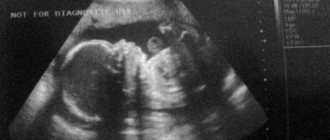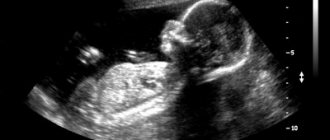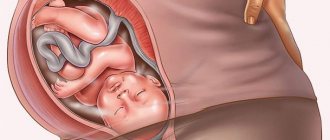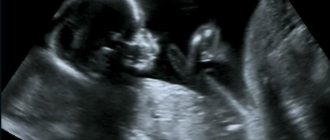Pregnancy lasts 10 obstetric and 9 lunar months. Obstetric months are divided into trimesters. The 7th month marks the beginning of the final, third trimester of the gestational period.
It's time for maternity leave. By law, maternity leave begins at the beginning of the 30th week, and in case of multiple pregnancy - from the 28th week.
Many mothers working in state enterprises have the right to paid leave, and therefore can go on maternity leave a couple of weeks earlier.
From the 30th week of the gestational period, active preparations for a new addition to the family begin: items for the newborn and hygiene products are purchased.
Fetal changes
At the 7th month of pregnancy, the weight of a fetus already reaches a kilogram, and its average height is 35 centimeters. A real baby! At this stage, the child begins to recognize parental voices and the voices of those who are often nearby. Also, the baby is already reacting to sounds, so it is extremely important to create a calm environment; with the beginning of the 7th month, a woman is recommended to listen to measured music, and best of all, classics, because it has been proven that children begin to feel more calm. By the seventh month, the fetus can already suck its thumb!
At 7 months of pregnancy, all the organs of the unborn baby are already formed, but continue to improve further. From the 29th week, the child is in full swing preparing for a life separate from the mother’s womb. The fat content in his body is already 4%, and plugs consisting of mucus come out of his nose and protect the respiratory organs from water ingress.
With the onset of the 30th week, the fetus should already assume the body position in which it will be during childbirth. There are cases when the baby has not yet turned around by this time, but there is no need to worry, because he can lie down differently until the 32nd week.
By the 31st week, the baby curls up more tightly in the stomach as he actively grows and there is less and less space. During this period, the facial features of the unborn baby become clearer and more expressive, and the pupils of his eyes are already the same as those of the “ready” baby!
The digestive organs begin to form at the 7th week, but by the 7th month of pregnancy they are almost ready for full-fledged independent work.
At 32 weeks, folds and wrinkles on the fetal face are smoothed out, weight can range from 1800 grams to 2 kilograms, and height can range from 42 to 45 centimeters on average.
If premature birth occurs at 7 months of pregnancy, the baby will be able to breathe on its own, but will require intensive care from medical personnel. The child's chances of surviving at this time are significant. But still, a pregnant woman needs to take care of herself in order to allow the baby to fully develop!
Seventh month of pregnancy - what period is it?
Gynecologists count the gestational age from the first day of the last menstruation before conception. There are 7 days in one obstetric week, and exactly 4 weeks in one month. Accordingly, the 7th month of pregnancy is:
- 29–32 weeks inclusive;
- first month of the third trimester of pregnancy;
- six full months of gestation (the seventh is underway).
The calculation of the period is carried out from the first day of the last menstruation.
At the 30th week of pregnancy, as a rule, the expectant mother is issued a certificate of incapacity for work. Maternity leave begins, which will last until the baby is about 2 months old (140 days in total). When carrying twins or triplets, maternity leave begins at the 28th week - at the end of the seventh month of gestation, and its duration is 40 days longer than usual. Along with the sick leave certificate, the pregnant woman receives from the antenatal clinic a birth certificate - a document that will need to be presented when the expectant mother arrives at the maternity hospital.
Changes in a woman
At 7 months of pregnancy, a woman becomes more anxious as her due date approaches. But you need to pull yourself together and calm down, because with her behavior a woman shapes the future character of the child.
Breathing becomes more difficult from 7 months of pregnancy as the uterus rises higher. To improve your well-being, you need to move more, walk in the park. If you feel tired, you can’t fight it, you need to lie on your back or side, and put a soft pillow between your knees. During movement, you may feel a contraction of the uterus, this is not scary. But if, at 7 months of pregnancy, the stomach pulls strongly, this feeling causes discomfort and even pain, then you need to urgently seek advice from the obstetrician leading the pregnancy.
From the seventh month, a woman may be bothered by false contractions, but this is even good, since nature in this way tests the body’s readiness for childbirth. Contractions should be irregular, painless, and not interfering with daily activities, otherwise consult a doctor immediately.
Itching felt on the skin of the abdomen signals the need to soften the epidermis and purchase a product to prevent the appearance of stretch marks. Unpleasant sensations on the skin indicate that it is stretched to the limit, but it is worth remembering that the active growth of the tummy is in full swing, so take care of your comfort and beauty.
At the 7th month of pregnancy, the breasts begin to prepare for the main mission in a woman’s life - feeding a new person! Liquid may begin to be released from it - this is colostrum, the most useful product that the mother will feed the baby in the first 2-3 days of life. The breasts increase in size, become heavy, and discomfort may be present. Buy a special support bra; specialized maternity underwear has pads into which the secreted colostrum will be absorbed; this is very convenient when you need to visit a public place and not feel discomfort.
Other unpleasant moments during the active growth of the abdomen are possible constipation, heartburn, increased gas formation, pain in the hypochondrium, nausea. All these symptoms are caused by the enlarging uterus pressing on the organs. To reduce symptoms and prevent their occurrence, you need to lower your blood pressure by eating small portions. At this time, it is advisable to consume more liquids and soups.
A woman should gain an average of half a kilo a week in weight; if there are strong discrepancies up or down, then you should talk to your doctor about your diet and diet. Pain may occur in the lower back, back, and legs as the bones and muscles are put under pressure from the increasing weight. There may be cramps in the calf muscles, enlargement of the legs (edema) and hemorrhoidal veins. A special brace and exercise for pregnant women can help with these symptoms.
When walking quickly, shortness of breath occurs, this is again due to the weight and pressure of the uterus on the organs. For this reason, pregnant women seem slow, thoughtful, and their gait is peculiar and a little awkward. Movements become cautious and clumsy.
How the fetus develops
Before the beginning of the third trimester, the fetus has formed body parts, organs and internal systems. Now comes the period of complete improvement of the cerebral cortex and accumulation of subcutaneous fatty tissue.
A seven-month fetus weighs on average from 1100 to 1800 g, height from 38 to 41 cm.
The body is covered with fluff, eyebrows and eyelashes are drawn on the face. The fluff covers the baby's entire body: back, arms, chest. Over time, it disappears, but sometimes, children born before 32 weeks have increased hair growth.
Convolutions and nerve endings are formed and improved. The baby is able to recognize the mother's mood, winces in bright light (even through the stomach and uterus), and reacts to loud sounds.
A decrease or absence of movements may be a consequence of the depressive mood of the expectant mother.
The internal secretion organs work at full capacity:
- the intestines process the amniotic fluid that enters the baby’s body with micronutrients, followed by the formation of meconium - original feces;
- the urinary system is formed and functioning, but some functions differ from the adult body;
- nutrients entering the fetal body are distributed evenly, glucose is produced in small quantities;
- the lungs are immature, but the child trains them by swallowing, which can manifest itself in the form of twitching of the abdomen, or sensations of goosebumps - this means that the child is “attacked” by hiccups;
- endocrine glands produce hormones that are sometimes necessary for the mother’s body.
The fetus supplies itself with oxygen. He has a functioning bone marrow that produces formed elements.
If you take blood from a fetus, it will contain immature leukocytes, red blood cells, hemoglobin higher than the adult norm, and platelets in smaller quantities.
Important points to know
- In the seventh month of pregnancy, a woman usually weighs 8-15 kilograms more than she did before pregnancy. Many people are afraid that they have become very fat and that after giving birth they will not be able to lose extra pounds. 90% of women manage to regain their previous figure; the secret is activity, exercise, and a balanced diet. We don’t say “proper nutrition,” since many people mean a diet consisting of steamed vegetables. Nutrition should be rational, it should contain meat, fish, vegetables, and cereals, but everything in reasonable quantities! There is no need to stuff yourself with double portions, worrying about the fat content and quantity of breast milk, the baby will not remain hungry, nature provides for the formation of milk in the required quantity.
- Heartburn increases, this may be due to weakening of the esophagus due to pressure on the uterine organs. In this case, it is not recommended to take soda; if swelling occurs, this substance can intensify it. Take special pills, but which ones? Only a doctor can tell you!
- Vaginal discharge becomes more intense in the seventh month. If they are light yellow or white, this is a sign of normality. Curdled discharge and itching indicate the development of thrush. Bloody or brownish ones are bad, as they signal the threat of premature birth or placental abruption.
- And again about nutrition: you need to eat a lot of fresh fruits and vegetables, take multivitamins prescribed by your doctor. All this will benefit not only the future baby, but also the mother. With a lack of vitamins, hair begins to fade and fall out, nails peel, skin and teeth deteriorate.
- Dyeing your hair is highly undesirable, because harmful components can enter the bloodstream through the skin.
What happens in the female body?
At the beginning of the seventh month, the fundus of the uterus is several centimeters above the navel, and by the end of this period it is located between the navel and the xiphoid process. Due to the enlarged uterus, the diaphragm changes its usual position, constricting the lungs. The consequence of this is shortness of breath, which becomes more intense even with little physical activity. Painful sensations often appear in the hypochondrium.
The action of pregnancy hormones makes a woman’s skin elastic and firm, as elastin and collagen are intensively synthesized in it. If these substances are not enough, the epidermis becomes thinner at the site of increased load - intradermal tears appear. The body fills them with connective tissue, resulting in stretch marks. Mostly they are located on the skin of the abdomen, chest, and thighs.
If the fetus is large, twins are expected; there is polyhydramnios; the appearance of stretch marks (stretch marks) is inevitable. For prevention, you can use vitaminizing moisturizers intended for pregnant women. It is recommended to supplement the use of such remedies with a light circular massage of the abdomen and pinching the skin. If there is uterine hypertonicity, such a massage may increase the risk of miscarriage.
The mammary glands produce colostrum, a precursor to breast milk. If it comes out, you need to use special pads in your bra and wash your breasts with cool water.
During the seventh month of pregnancy, weight gain is 1200-1600 g, approximately 300-400 g per week. The total weight gain since the beginning of the gestational period is 7-11 kg. This variation is due to the difference in the body composition of pregnant women - the lower the body weight before pregnancy, the higher the increase.
Belly size
This parameter depends on the woman’s physique, the structural features of the internal organs, and it is unique for each pregnant woman. Some walk around with a huge belly, and it seems that the time has come to give birth or the woman is carrying more than one fetus. Others have a small belly and are invisible under loose clothing, and many do not even realize that the woman is going to become a mother!
A small belly in the 7th month of pregnancy may indicate infertility, lack of amniotic fluid, a delay in the physical development of the baby, or an incorrectly set due date. To diagnose possible “problems”, it is recommended to consult a doctor. You may have to undergo an unscheduled ultrasound.
At 7 months of pregnancy, a small belly size may not indicate any problems at all, so don’t panic ahead of time. Every woman's body type is different. If you had a belly before pregnancy, it will be larger during pregnancy. If a woman has a flat tummy and thinness, then the stomach can be very small, and at the same time the size and weight of the child will be normal.
The doctor will notice any discrepancies, if any, and refer you for a proper examination.
Possible problems
In the 7th month of pregnancy, complications may arise, the causes of which cannot always be accurately identified. They have the peculiarity of sometimes having a negative impact on the development of the fetus, leading to premature birth or a significant deterioration in the well-being of the mother herself. Let's look at these problems in more detail:
- intrauterine growth retardation. This diagnosis can cause panic in a pregnant woman, but it does not always indicate developmental pathologies. Experts can also use this term to designate a slight lag in the weight and growth of the fetus from the norms accepted for a given period. So, if these indicators decrease by no more than 10%, the mother can be prescribed vitamins, good nutrition, sleep and rest. Intrauterine growth retardation is determined by ultrasound results. To improve the nutrition of the fetus, the mother may be prescribed bed rest, recommended to go to hospital, and prescribed medications: Actovegin, Trental, Curantil, Instenon and others. The delay can also be caused by bad habits of the mother, constant stress, malnutrition, chronic diseases, placental insufficiency. Significant developmental delays in the fetus are most often caused by genetic disorders. It is established at an earlier stage and may be an indication for artificial termination of pregnancy with the woman’s consent;
Most problems with fetal development are diagnosed by ultrasound - premature birth. Babies born in the 7th month have every chance of survival if the birth takes place in an equipped perinatal center and the newborn is provided with the necessary resuscitation procedures. Most likely, the baby will need to stay in an incubator for several days or weeks. Signs of labor beginning are regular contractions (more than once every 1.5 hours with an equal break), passage of the mucous plug and amniotic fluid, bleeding, and pain in the lower abdomen. If the rupture of water and the complete removal of the mucus plug have not occurred at the time the mother contacts the doctors (there are only contractions or bleeding), then doctors can try to stop labor by administering injections of drugs that stop uterine contractions. Subsequently, the woman is placed in a hospital and her condition is monitored until delivery;
- gestosis. This condition is also called late toxicosis. It is typical for pregnant women in the second half of the gestation period. The main symptoms of gestosis are high blood pressure, the presence of protein in a urine test, and severe swelling. If at least two of these signs are present, gestosis is diagnosed. This condition can be dangerous for both mother and baby - call an ambulance immediately . In difficult cases, gestosis can cause a stroke or body convulsions in a woman. For the fetus, this condition is fraught with the occurrence of hypoxia - oxygen starvation. Treatment of gestosis is symptomatic. If the woman has high blood pressure, she is prescribed medications to reduce it; for edema, a salt-free diet and limited fluid intake are recommended; if protein appears in urine tests, medications that normalize the activity of the kidneys and urinary system are recommended. Also, the mother will be advised to go to a hospital, and after her condition normalizes, her treatment can be done on an outpatient basis;
Triad of symptoms of preeclampsia (preeclampsia): protein in the urine, high blood pressure and edema - placenta previa. Normally, the placenta is located in the upper part of the uterus or on its wall. If this organ is attached too low, then it blocks the internal os of the cervix, which can lead to bleeding, fetal hypoxia, and in the worst case, premature birth. This condition requires constant monitoring by doctors, whose task is to prolong the pregnancy as long as possible and avoid premature birth. In the 7th month of pregnancy, when making such a diagnosis, a hospital stay and physical and emotional rest are relied upon. Antispasmodic drugs (No-spa) and tocolytics (Fenoterol) are prescribed. To improve fetoplacental blood flow, injections of Ascorbic acid and Pentoxifylline are used.
Nausea at 7 months pregnant
The age-old question: why do you feel sick during pregnancy? In the first trimester this is called toxicosis and is not a cause for concern. But doctors begin to worry if a woman suffers from nausea even in the third trimester, and this phenomenon is given another definition - gestosis.
Not only women over 35 years of age, but also very young mothers can suffer from gestosis, and this is already a pathological course of pregnancy.
Preeclampsia is accompanied by such unpleasant moments as dizziness, fainting, increased blood pressure, and headaches. This happens due to severe vasoconstriction, which leads to insufficient oxygen supply to the blood and placenta, which is fraught not only for the mother, but also for the health and development of the baby. During gestosis, a woman’s vision can noticeably deteriorate, and in especially severe cases, a cerebral hemorrhage occurs, which can lead to death of the woman in labor and the baby.
If there was gestosis during pregnancy, then the consequences of its influence on the body disappear within two whole years. During this period, all blood counts will be abnormal.
Changes in a woman's body
No special changes have been observed in a pregnant woman since the 29th week of gestation. The hormonal background is labile. The hormones produced are aimed at maintaining uteroplacental blood flow.
With an incorrect diet or a pathological course of gestation, edema may appear. Gynecologists strongly advise carefully monitoring your diet and avoiding swelling, as the risk of increasing renal pressure increases.
The nature of vaginal discharge remains the same. White or slightly yellowish mucus is normal.
By week 28, the volume of mucous discharge may increase. This is due to changes in the composition of the amniotic fluid and its frequent renewal.
The pressure on the spine increases, so expectant mothers have to resort to wearing a prenatal bandage. Gait changes due to muscle relaxation.
Symptoms that worry most pregnant women:
- phlebeurysm. To eliminate it, constant compression is necessary by wearing stockings or tights;
- digestive problems and difficulty with bowel movements;
- urinary incontinence;
- increased vaginal discharge, which leads to constant wearing of panty liners. It is important to distinguish vaginal discharge from amniotic fluid. They have a liquid consistency and are colorless;
- pigmentation does not disappear.
The start of maternity leave allows the pregnant woman to rest and get enough sleep while she can.
What to do with gestosis?
Nausea in the 7th month of pregnancy should not remain a secret to the attending physician, since gestosis is not just toxicosis, but a dangerous pathology.
Self-medication is prohibited! An obstetrician-gynecologist will prescribe medications that will help overcome the disease and improve the woman’s well-being.
In addition to medications, outdoor recreation, bed rest, and herbal decoctions will be prescribed.
Recommendations
The seventh month of pregnancy is one of the most important stages of bearing a baby. To avoid complications and all sorts of troubles, it is advisable for the expectant mother to adhere to the following recommendations:
- It is necessary to limit contact with strangers as much as possible in order to avoid infection with infectious diseases such as influenza and colds (ARVI). Despite the fact that the fetus at the 7th month of pregnancy already has its own immune defense, and the infection cannot cause any congenital pathologies in its development that would require termination of pregnancy, it is still necessary to observe preventive measures, because any disease of the expectant mother, with which increases the temperature, worsens the baby’s condition.
- Due to the development and strengthening of fetal bone tissue, a pregnant woman’s need for calcium increases, as a result of which teeth may suffer. Since dental treatment during the third trimester is carried out in the most extreme cases, it is necessary to take all measures to preserve tooth enamel by ensuring careful oral care and organizing a balanced diet.
- Any flight or long trip is difficult for an expectant mother who is 7 months pregnant. When lifted into the air on an airplane, a woman may experience increased blood pressure, vomiting, and blocked ears. All this negatively affects the condition of the fetus, so flying or traveling in other ways is possible only in the most extreme cases, for example, if an urgent move is necessary. It is also undesirable to go to the sea, because sunbathing in the third trimester of a pregnant woman is contraindicated.
- On the advice of a doctor, you can perform special exercises for pregnant women, but some exercises may be contraindicated.
- It is better to abstain from intimate relationships for a period of 7 full months; as a last resort, you should choose the safest positions. An orgasm is especially dangerous for an expectant mother, as it can cause excessive contraction of the uterine walls and, as a result, cause premature birth. Of course, masturbating is all the more undesirable, because it can lead to very negative consequences.
- When doing homework, it is better not to bend over to prevent compression of the abdomen. If you need to bend down to, for example, put on your shoes or pick up scattered objects on the floor, you can carefully kneel down or sit on a small chair or low ottoman.
You can find out more about what happens during the 7th month of pregnancy on a specialized forum. If possible, you should attend courses for expectant mothers and watch videos, which will allow you to best prepare for the arrival of a new family member.
Pregnancy and colds
It is easier to prevent a cold than to cure it; this statement is true for everyone, especially for pregnant women. To avoid getting sick, use the following recommendations:
- avoid public places during the height of the cold and flu epidemic;
- if you need to go to the store, clinic, or visit a antenatal clinic, put a gauze bandage on your face;
- when you come home from the street, gargle with herbal infusions and water with salt and soda, rinse your nose;
- Take vitamins prescribed by your doctor.
How to treat a cold during pregnancy?
If, nevertheless, a woman catches a cold at 7 months of pregnancy, what should she do? If you have a cold in the seventh month, and at all other times, you should strictly adhere to the rules:
- In no case should you choose treatment on your own, because many drugs are contraindicated in a situation such as pregnancy.
- Call a therapist to your home rather than going to an appointment in person. The rule “infection does not stick to infection” does not work! There are a huge number of viruses that you can take with you into the vicinity of existing ones.
- Contact your doctor at the first symptoms of the disease to prevent it from developing and harming your baby.
- Maintain bed rest throughout your illness.
- Use not only prescribed medications, but also folk remedies recommended by your doctor.
- Stable ventilation of the room will help you recover faster.
- Drink more fluids to flush out toxic substances from your body.
Analyzes and research
By the end of the seventh month, visits to the gynecologist become more frequent. The time has come for re-examination by specialists.
At the turn of 29-30 weeks, consultations and examinations of the following doctors are necessary:
- dentist;
- ophthalmologist;
- ENT;
- endocrinologist (if necessary);
- cardiologist and heart electrocardiogram;
- therapist for an opinion on the health status of the pregnant woman.
By the 31st week of gestation, blood, urine and vaginal secretions should be examined:
- The blood is re-donated for general analysis, biochemistry and coagulogram. The recording of antibodies or hemolysins continues (applies to mothers with negative Rhesus or first blood group). A study is being conducted for TORCH infections, hepatitis and EDS.
- Urine is collected for 3 types of research: general analysis, sterility and bacterial culture. If necessary, it is examined using the method of Nechiporenko and Zimnitsky.
- Vaginal discharge is collected to identify pathogenic flora. If it is detected, further examination is carried out in the form of bacterial culture and determination of the species of the microbe.
A routine visit to the doctor remains unchanged, which includes measurement, weight, uterine level and listening to the heartbeat.
Additional ultrasound examination is carried out according to indications.
For Rh-negative mothers in the absence of Rh antibodies, immunoglobulin is administered (at 28 weeks).
Premature birth
Childbirth at 7 months of pregnancy occurs quite often, and modern technologies and the knowledge of doctors make it possible in most cases to save the baby’s life. The causes of premature birth can be:
- Falling, receiving various types of injuries.
- Diseases.
- Carrying heavy things.
- Stress, anxiety, psychologically unfavorable environment in the family or at work.
- Difficult working conditions, standing work for more than 6 hours a day.
- Bad habits.
- Long-distance travel, overexertion, airplane flights, long-distance train trips.
- Premature placental abruption.
- Damage to the fetus.
- Polyhydramnios.
- Multiple pregnancy.
- Infections.
- Disturbances in the structure of the uterus.
Childbirth at 7 months is an abnormal phenomenon, and it has its own complications, which mostly affect the baby. The consequences of premature birth can be:
- The child’s lungs are still underdeveloped at this stage, so in 60% of cases breathing complications and even pauses in breathing occur. Typically, babies born before the 8th month of pregnancy are placed under a dome with a high oxygen content in the ICU (intensive care ward).
- Neurological complications (hyperactivity, isolation, learning problems), disorders in brain development.
But all these consequences and complications are detected at an early stage and are well eliminated with intensive therapy. In 99% of cases, after a couple of months, a premature baby cannot be distinguished from peers born on time!
Feel
The child continues to grow and develop in the female body. Mom feels his presence with daily movements. The growing uterus gradually puts pressure on surrounding organs.
It puts particular pressure on the bladder and distal colon. The urge to urinate and difficulty with bowel movements are constantly disturbing.
Due to the stretching of the muscle layer, the epidermis becomes thinner, collagen is lost and the first stretch marks appear. Their presence can cause serious disruption in the intrauterine life of the fetus, so it is necessary to monitor their appearance.
Favorite places for stretch marks are the thighs, chest, and abdomen. In pregnant women, stretch marks appear as the gestation period increases.
At 7 months, the weight increases by 6-8 kg, so the skin stretches and “tears”. This is especially noticeable in girls with a lack of elastin and collagen.
Sleep deteriorates and it becomes more difficult to find a comfortable sleeping position. Sometimes excessive information received during the day and an uncomfortable position lead a woman to a state of insomnia. Nervousness and irritability appear.
The hormonal background of the expectant mother is unstable and the addition of exogenous diseases or exacerbation of existing chronic processes is possible.











